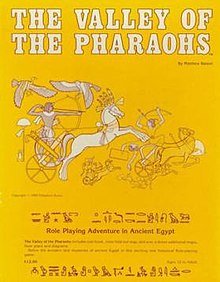 Ever wondered where Palladium's preoccupation with the gods of Egypt comes from? I did. They crop up everywhere, from its fantasy game to its flagship (RIFTS), and for a game publisher that's often mocked for its warnings on the occult there are few other routes to such a seeming obsession with Egypt and her gods.
Ever wondered where Palladium's preoccupation with the gods of Egypt comes from? I did. They crop up everywhere, from its fantasy game to its flagship (RIFTS), and for a game publisher that's often mocked for its warnings on the occult there are few other routes to such a seeming obsession with Egypt and her gods.
"Few", however, is not "none". It turns out that one of Palladium Books' earliest games was a historical one: Dynastic Egypt. Back in 1983, Palladium published Valley of the Pharaohs. It's been out of print since it sold through that one print run, not seen since other than its influence upon the more popular product lines.
Go figure. I've never seen it on the shelf, so I never played it. No one I know ever saw or played it either. However, given that this is one of two games written by someone other than Kevin Siembieda (in whole or in part) and not using the Palladium house system of rules, it is no surprise that it is out of print now. It is also the most probable origin for why Palladium's games have so much gratuitous Egyptianism in it; it's just recycling the results of work done for this long-lost product. Lazy? Maybe, but given the decades-long pattern of behavior out of this company it's the most probably answer.
 That's not the only historical RPG that Palladium published. The better known-one, and occasionally found on the shelves is RECON. This is another game Palladium published by did not create, and does not use its house ruleset. The reason it sticks around is simple: a game about Vietnam found fans then as it struck during the time when movies and shows about Vietnam made by Baby Boomers hit popular audiences in the United States. With the later supplements stretching the scope of the game beyond that war, world-wide mercenary action gaming became viable.
That's not the only historical RPG that Palladium published. The better known-one, and occasionally found on the shelves is RECON. This is another game Palladium published by did not create, and does not use its house ruleset. The reason it sticks around is simple: a game about Vietnam found fans then as it struck during the time when movies and shows about Vietnam made by Baby Boomers hit popular audiences in the United States. With the later supplements stretching the scope of the game beyond that war, world-wide mercenary action gaming became viable.
It's a short step from there to doing all sorts of Cold War shenanigans, ala Metal Gear Solid 3 and certain other games in that franchise. You can see from this game what went into the thinking of Ninjas & Superspies, specifically from the Mercenary side of the game (cribbing also from Heroes Unlimited's Supersoldier options), but the game itself is anything but a heroic adventure game. It's barely more than a wargame, and it shows; if you can handle that much liminality, then track down a copy and give it a go. Otherwise, this may not be for you.
It's a curious thing to see these historical games in the catalog. They're not the usual action-adventure games, and I think that is a big reason for their also-ran or memory-holed status. Most gamers don't want to play historical games, seeing no room for play in such a setting and insufficient differentiation of roles to assume. (That's Mech Piloting influence in action, by the way.), and they don't find in such games the escapism that they seek. Fantastic counterparts always do better than historical games, and we see this play out again here.
No comments:
Post a Comment
Anonymous comments are banned. Pick a name, and "Unknown" (et. al.) doesn't count.